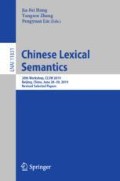Abstract
Deep learning approaches for targeted sentiment classification do not fully exploit linguistic knowledge. In this paper, we propose a Linguistic Knowledge based on Attention Neural Network (LKAN) to employ linguistic knowledge (e.g. sentiment lexicon, negation words, intensity words) to benefit targeted sentiment classification. Firstly, we extract linguistic knowledge words (e.g. sentiment lexicon, negation words, intensity words) in sentences by HowNet vocabulary. Then, we design an attention mechanism which drives the model to concentrate on such words and get a weighted combination of word embeddings as the final representation for the sentences. We evaluate our proposed approach on SemEval 2014 Task 4, whose performance as shown reaches the most advanced level.
Access this chapter
Tax calculation will be finalised at checkout
Purchases are for personal use only
Notes
References
Kiritchenko, S., Zhu, X., Cherry, C., et al.: NRC-Canada-2014: detecting aspects and sentiment in customer reviews. In: Proceedings of SemEval, pp. 437–442 (2014)
Wagner, J., Arora, P., Cortes, S., et al.: DCU: aspect-based polarity classification for SemEval task 4. In: Proceedings of SemEval, pp. 223–229 (2016)
Vo, D.-T., Zhang, Y.: Target-dependent twitter sentiment classification with rich automatic features. In: Proceedings of IJCAI, pp. 1347–1353 (2015)
Socher, R., Pennington, J., Huang, E.H., et al.: Semi-supervised recursive autoencoders for predicting sentiment distributions. In: Proceedings of the 2011 Conference on Empirical Methods in Natural Language Processing, pp. 151–161 (2011)
Socher, R., Perelygin, A., Wu, J., et al.: Recursive deep models for semantic compositionality over a sentiment treebank. In: Proceedings of the 2013 Conference on Empirical Methods in Natural Language Processing (2013)
Tai, K.S., Socher, R., et al.: Improved semantic representations from tree-structured long short-term memory networks. In: Proceedings of ACL-2015, pp. 1556–1566 (2015)
Tang, D., Qin, B., et al.: Effective LSTMs for target-dependent sentiment classification. In: Proceedings of COLING-2016, pp. 3298–3307 (2016)
Wang, Y., Huang, M., et al.: Attention-based LSTM for aspect-level sentiment classification. In: Proceedings of EMNLP-2016, pp. 606–615 (2016)
Tang, D., Qin, B., et al.: Aspect level sentiment classification with deep memory network. In: Proceedings of EMNLP-2016, pp. 214–224 (2016)
Ma, D., Li, S., Zhang, X., et al.: Interactive attention networks for aspect-level sentiment classification. In: Proceedings of IJCAI-2017, pp. 4068–4074 (2017)
Li, L., Liu, Y., Zhou, A.Q.: Hierarchical attention based position-aware network for aspect-level sentiment analysis. In: Proceedings of the 22nd Conference on Computational Natural Language Learning, pp. 181–189 (2018)
Wang, J., Li, J., Li, S., et al.: Aspect sentiment classification with both word-level and clause-level attention networks. In: IJCAI, pp. 4439–4445 (2018)
Ding, X., Liu, B., Yu, P.S.: A holistic lexicon-based approach to opinion mining. In: Proceedings of the 2008 International Conference on Web Search and Data Mining, pp. 231–240 (2008)
Jiang, L., Yu, M., Zhou, M., et al.: Target-dependent Twitter sentiment classification. In: Proceedings of the 49th Annual Meeting of the Association for Computational Linguistics: Human Language Technologies-Volume 1, pp. 151–160 (2011)
Zhao, W.X., Jiang, J., Yan, H., et al.: Jointly modeling aspects and opinions with a MaxEnt-LDA hybrid. In: Proceedings of the 2010 Conference on Empirical Methods in Natural Language Processing, EMNLP 2010, pp. 56–65 (2010)
Chen, P., Sun, Z., Bing, L., et al.: Recurrent attention network on memory for aspect sentiment analysis. In: Proceedings of the 2017 Conference on Empirical Methods in Natural Language Processing, pp. 452–461 (2017)
Zheng, S., Xia, R.: Left-center-right separated neural network for aspect-based sentiment analysis with rotatory attention. arxiv preprint arXiv:1802.00892 (2018)
Huang, B., Ou, Y., Carley, K.M.: Aspect level sentiment classification with attention-over-attention neural networks. arxiv preprint arXiv:1804.06536 (2018)
Qian, Q., Huang, M., Lei, J., et al.: Linguistically regularized LSTMs for sentiment classification. arXiv preprint arXiv:1611.03949 (2016)
Kumar, A., Kawahara, D., Kurohashi, S.: Knowledge-enriched two-layered attention network for sentiment analysis. arXiv preprint arXiv:1805.07819 (2018)
Lei, Z., Yang, Y., Yang, M., et al.: A multi-sentiment-resource enhanced attention network for sentiment classification. arXiv preprint arXiv:1807.04990 (2018)
Pennington, J., Socher, R., Manning, C.: Glove: global vectors for word representation. In: Proceedings of the 2014 Conference on Empirical Methods in Natural Language Processing (EMNLP), pp. 1532–1543 (2014)
Mikolov, T., Sutskever, I., Chen, K., Corrado, G.S., Dean, J.: Distributed representations of words and phrases and their compositionality. In: Advances in Neural Information Processing Systems, pp. 3111–3119 (2013)
Chung, J., Gulcehre, C., Cho, K.H., Bengio, Y.: Empirical evaluation of gated recurrent neural networks on sequence modeling. arXiv preprint arXiv:1412.3555 (2014)
Wagner, J., Arora, P., Cortes, S., et al.: DCU: aspect-based polarity classification for SemEval task 4. In: Proceedings of SemEval, pp. 223–229 (2014)
Tieleman, T., Hinton, G.: Lecture 6.5-RMSprop. In: COURSERA: Neural Networks for Machine Learning (2012)
Acknowledgments
This work is supported by Beijing Natural Science Foundation (Project No. 4192057).
Author information
Authors and Affiliations
Corresponding author
Editor information
Editors and Affiliations
Rights and permissions
Copyright information
© 2020 Springer Nature Switzerland AG
About this paper
Cite this paper
Du, C., Liu, P. (2020). Linguistic Knowledge Based on Attention Neural Network for Targeted Sentiment Classification. In: Hong, JF., Zhang, Y., Liu, P. (eds) Chinese Lexical Semantics. CLSW 2019. Lecture Notes in Computer Science(), vol 11831. Springer, Cham. https://doi.org/10.1007/978-3-030-38189-9_50
Download citation
DOI: https://doi.org/10.1007/978-3-030-38189-9_50
Published:
Publisher Name: Springer, Cham
Print ISBN: 978-3-030-38188-2
Online ISBN: 978-3-030-38189-9
eBook Packages: Computer ScienceComputer Science (R0)

